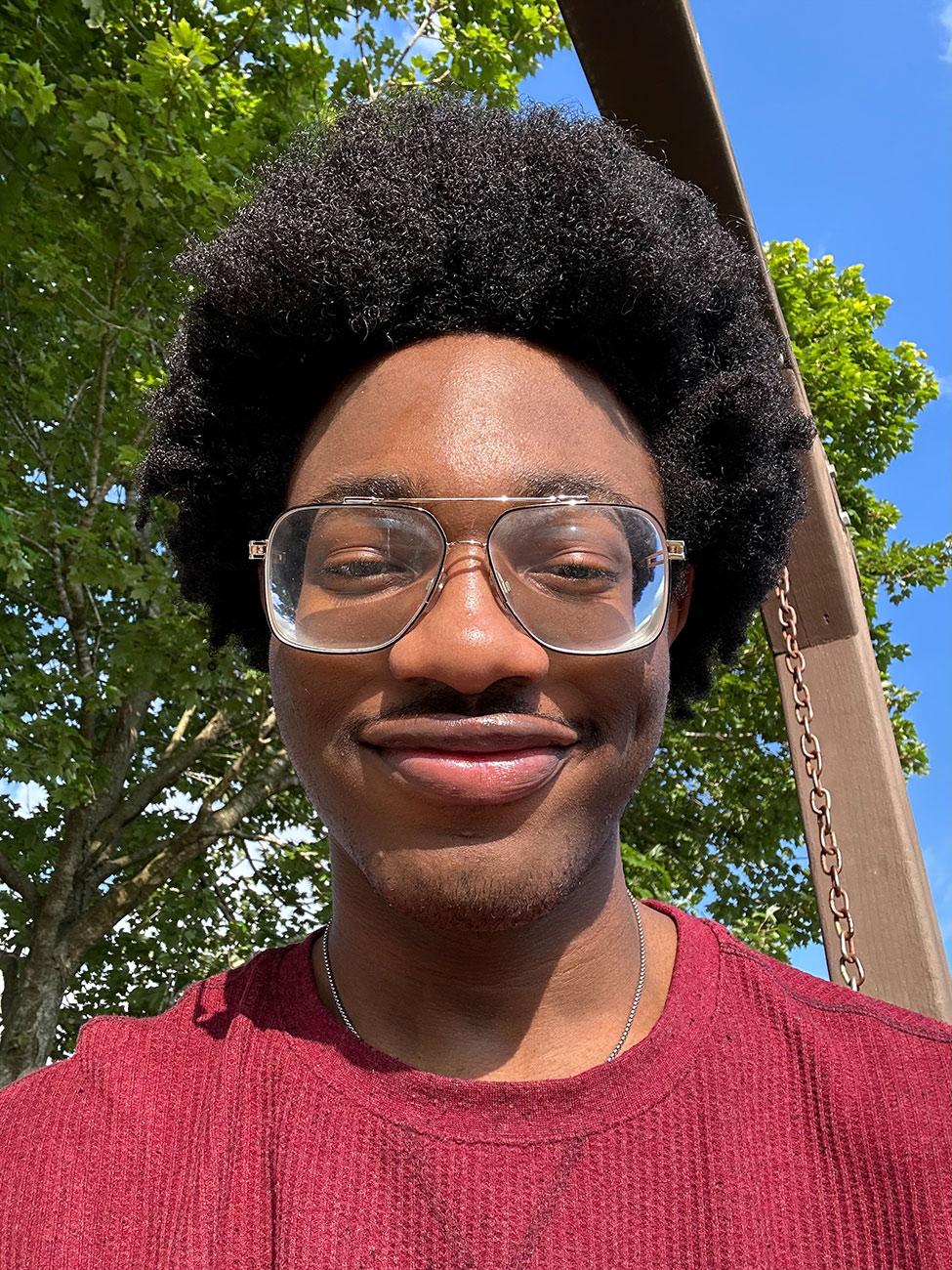
Changing the Narrative: Q+A with Nate Augustin
Nate Augustin ’27, a Writing for Diversity and Equity in Theater and Media major, shares how Pace University became the perfect platform for his voice, his transformative experiences in the program, and his hopes for creating inclusive spaces in theater and media.
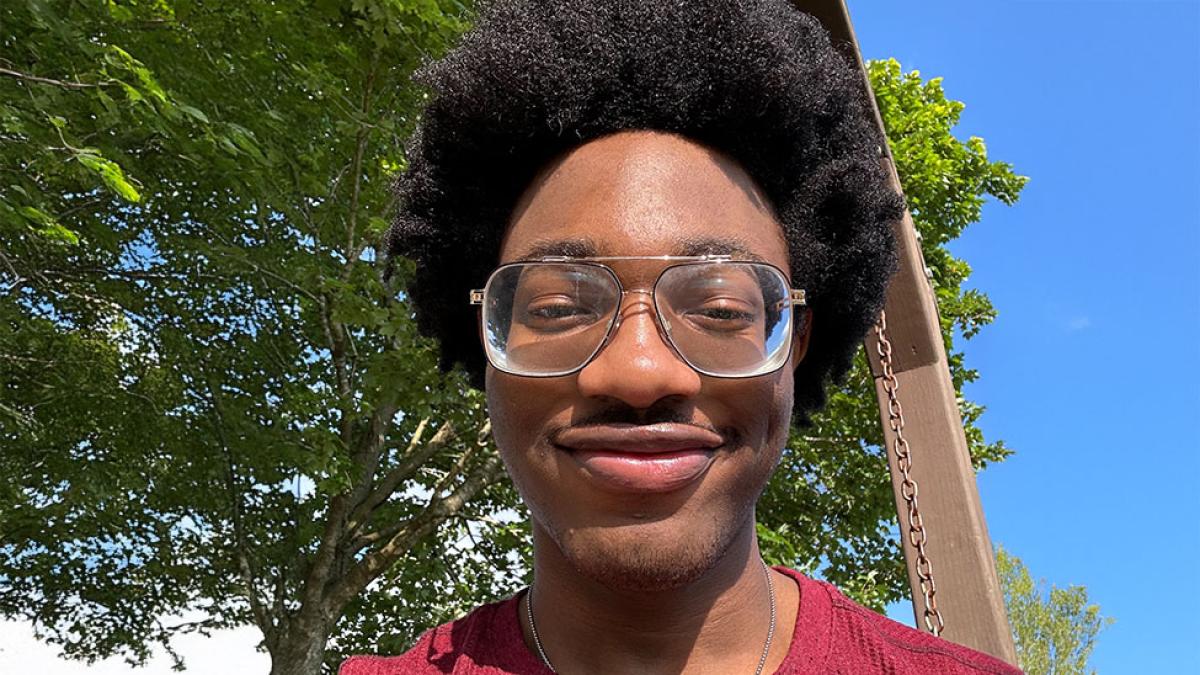

Nate Augustin
Class of 2027
BA in Writing for Diversity and Equity in Theater and Media
How did you become interested in pursuing a BA in Writing for Diversity and Equity in Theater and Media?
I’ve always had a deep passion for theater and storytelling. I love to write stories; I love to write people. Ultimately, I just have a story in my heart—a story much too passionate to contain. But it’s a story I struggle to tell, to find space for, because the entertainment industry has been so white-centric for decades, and my story does not always fit in their spaces. There are rules, expectations, and limitations imposed upon us all, but its adverse effects impact marginalized groups at a much worse rate. So, I struggle to tell my story in the way that feels right.
When I found this program at Pace, it wasn’t as though my pen had suddenly wielded a new, mystical power. But the fact that it exists at Pace means that I can exist in the world I want to exist in. I can exist in New York theater and not be what is expected of me; I can be less than gold; I can be more than product. I can be me, and my story can exist. The BA in Writing for Diversity and Equity in Theater and Media makes me hopeful. At times, when I felt that I would never tell my story, it made me feel like I could. I know that if I can, the next person can, too.
Why did you choose to attend Pace?
I chose to attend Pace because this was the only place where I thought I would feel “right.” And at Pace, I knew I was going to be somewhere where I was not alone in that feeling. I could make the most of this school, especially as it’s in New York City, the heart of American theater.
The BA in Writing for Diversity and Equity in Theater makes me hopeful. At times when I felt that I would never tell my story, it made me feel like I could. I know that if I can, the next person can, too.
What have your experiences been like in this program? How have faculty or others been influential in your journey?
I have found this program to be very welcoming. Originally from Atlanta, Georgia, and a first-generation college student, I was kind of overwhelmed to begin college and in a new city, but the students, administrators, and faculty in this program did their best to make sure I felt at home. Seeing the work they put into it is not only inspiring, but actively beneficial.
Assistant Dean S. Brian Jones is continually providing us with opportunities to showcase and produce our works, whether through workshops or events, such as a recent one called The Future of the Humanities. In addition, both he and Colby Hopkins, the program coordinator, continuously advocate for students, and a recent example of that has been securing funding for scholarships as well as for student projects for several years to come. I believe that this is only the beginning and that my experience will continually benefit from their incredible work.
What kind of activities have you been engaged in as part of this program and how have they been meaningful to you?
The workshops the program has hosted have been great, and it’s always exciting to feel like we are making a difference. An example is a DEI workshop for Pace Performing Arts (Sands College), through which I was able to witness, in real time, what happens when people who had not previously shared their voices are given a space to do so. It was so inspiring for so many.
As part of the program, we’ve also had the privilege of seeing some professional works, such as a preview of the Broadway show, How to Dance in Ohio, and it was really enlightening to witness a cast of neurodivergent actors and characters living authentically. In addition, engaging in several discussions after the shows has opened me to so many perspectives, and having a space in which we can all share and explore these experiences, their importance, and how we can improve them in our storytelling gives me hope for the future of the arts.
What other activities and organizations are you involved with at Pace?
I am a peer tutor for writing services at the Pace Learning Commons.
What would you like to do upon graduation/what are your career goals?
I plan to continue to write and produce my plays.
What advice would you like to give to our current students?
2023 was a very monumental year of change for me. I had incredible successes and devastating failures, and yet I persevered. At the beginning of 2024, I insisted on continuing to overcome previous challenges. After all, I’ve conquered them already, and why would I settle for any less? That is to say, whatever you accomplished yesterday, know you can do twice as much today.
Dumplings and Downtown: Exploring Chinatown Through NYC’s History
History tastes better with dumplings! Read about University Librarian Steve Feyl’s “Dumpling Tours” where he leads students through Chinatown, sharing NYC’s past one delicious bite at a time.

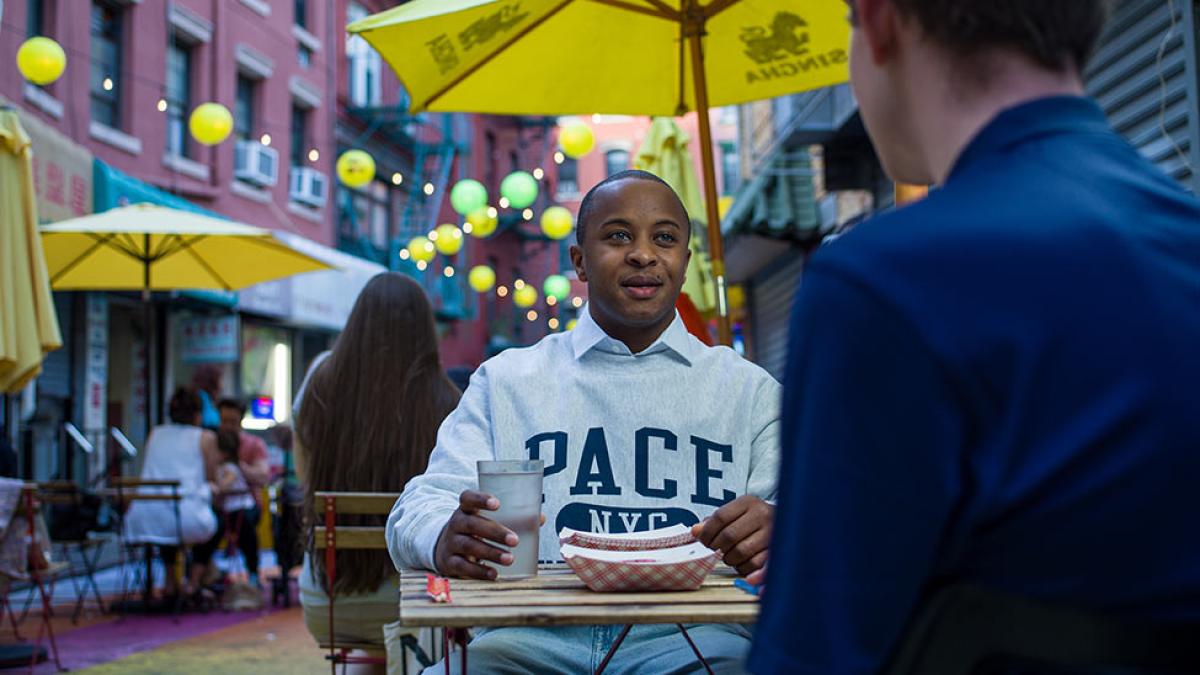
What do dumplings and Manhattan’s history have in common? For Pace University Librarian Steve Feyl, the answer lies in connection. His “Dumpling Tours” take students on a journey through Chinatown, blending delicious bites with stories of New York City’s past.
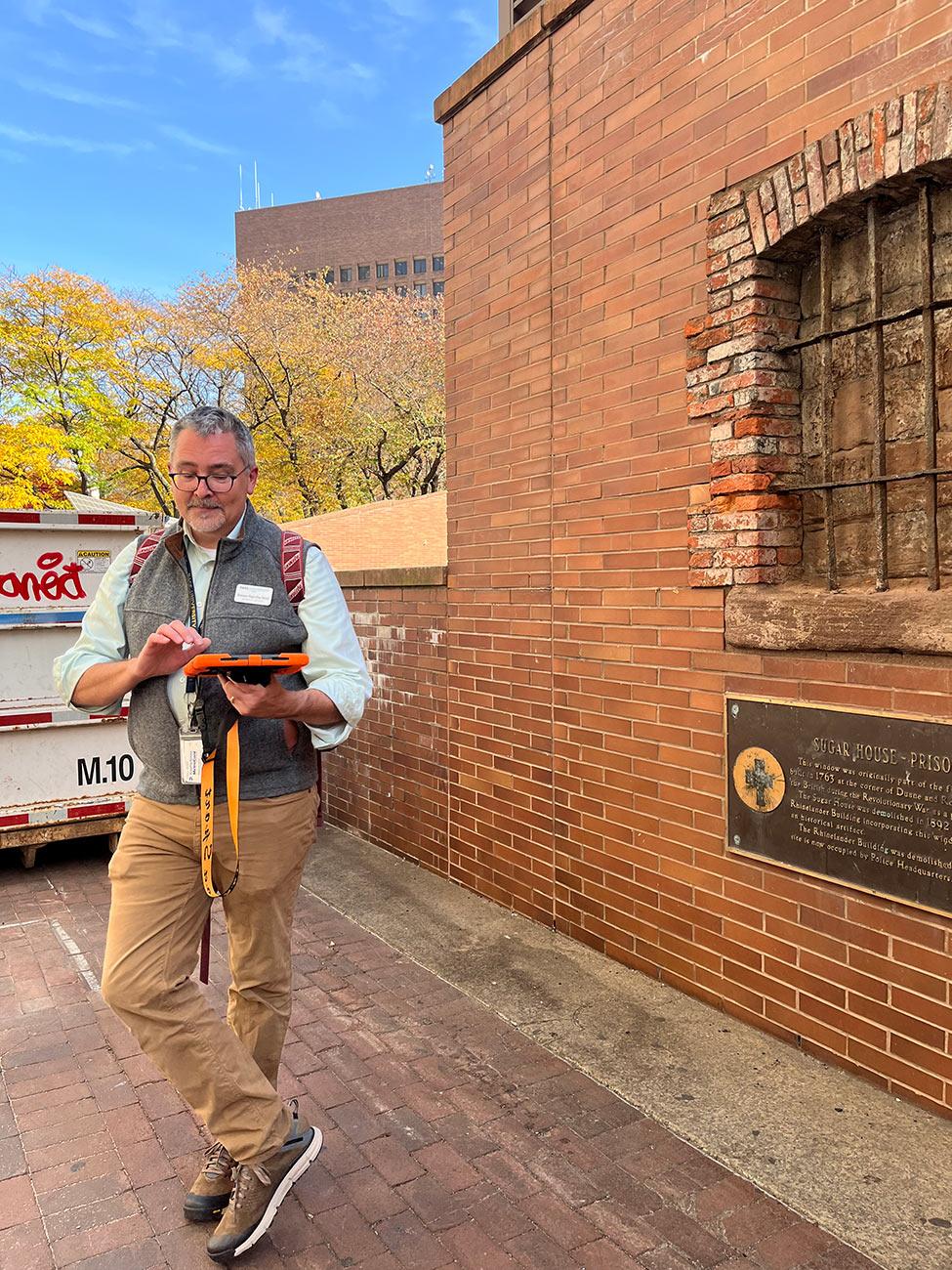
He started offering these tours in Fall 2022, following the COVID-19 pandemic. “I wanted to get students to re-engage with the library and also the local community around the New York City Campus,” Feyl shares. Students gather with Feyl outside One Pace Plaza, making their way through Chinatown to pick up dumplings before settling in for a picnic. With every stop, Feyl invites students to explore the city and its history.
Feyl’s tour weaves through the rich history surrounding Pace’s downtown campus, touching on the Lenape, Manhattan’s original inhabitants, the story behind Philadelphia-born Benjamin Franklin’s statue outside One Pace Plaza (hint: it involves publishing!), and the lasting impact of the Chinese Exclusion Act on Chinatown, including its relevance to discussions about the proposed Chinatown jail.
All the ghosts of the strange and fascinating things that happened where Pace now resides! —Feyl
A favorite story of his involves P.T. Barnum, the Brooklyn Bridge, and an elephant named Jumbo! The people of New York did not have much faith in the newly constructed Brooklyn Bridge so in 1884, P.T. Barnum convinced the city to let him march animals from his circus, led by the famous elephant Jumbo, across the bridge to prove its safety. “I try and imagine the spectacle of all those animals walking up Park Row in front of where Pace Plaza now resides and across the bridge to show that the bridge was stable,” Feyl says. “All the ghosts of the strange and fascinating things that happened where Pace now resides!”
Namitha Hebbal ’25, pursuing her MS in Marketing, Social Media, and Mobile Marketing, attended one of the tours in October with her roommate. An international student from India, Namitha explored Chinatown, discussing the difference between the tour’s dumplings and food from home, and soaked in the history of New York City. “The tour was not only was a memorable experience for us students but also a great way to give back to the communities at Chinatown which Pace is so closely located to,” says Namitha. “I absolutely loved getting to witness the passion which Steve has for history and food.”
Sometimes a common bond over something like a love of dumplings is just what you need to spur on a new friendship. —Feyl
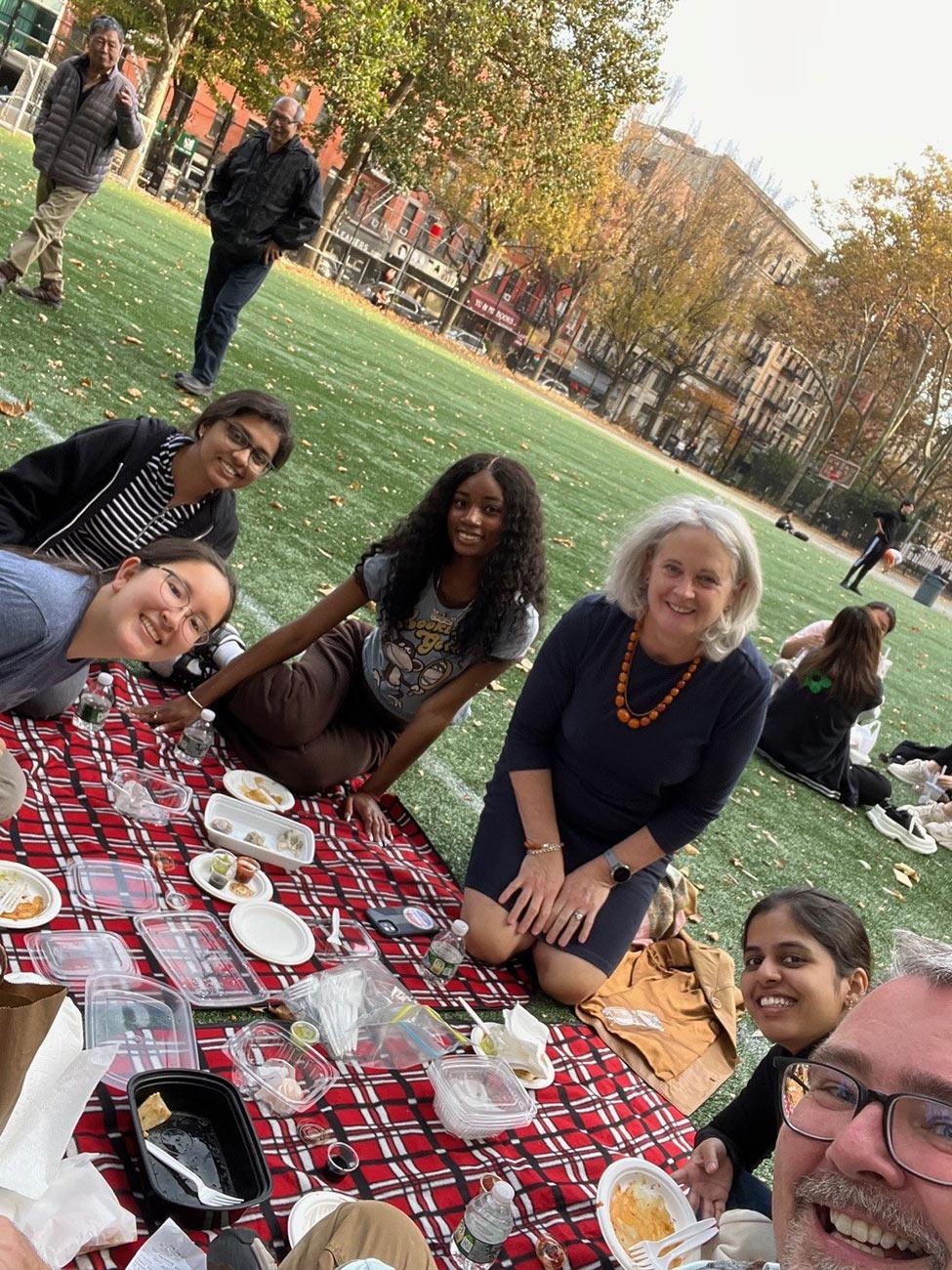
And then, of course, there’s the dumplings. The tour group picks up a variety of different dumplings prepared different ways and enjoy a picnic, comparing their favorite flavors and styles. Sometimes even stopping at Nom Wah, Chinatown’s oldest dimsum restaurant, owned for generations by Pace alumnus Wilson Tang ’00 and his family. “Who doesn’t like dumplings!” Feyl says.
But really, the dumplings are just a means to an end. They are an excuse for the journey, providing openings for connection. “Sometimes a common bond over something like a love of dumplings is just what you need to spur on a new friendship,” Feyl says. He describes how after one of his tours finished eating their dumplings, they decided to stay in Chinatown for ice cream, despite having only just met. Feyl says, “As I watched them go off on their own it made me feel so happy that perhaps the tour was the mechanism to create a bond between those students who might have gone from strangers to friends that day.”
I hope that they take away a sense of curiosity, adventurousness, and exploration. —Feyl
The tours are all about connection—Feyl even invites “celebrity guests,” Pace staff and faculty who join the fun and connect with students. In October, Vice President for Strategy and Partnerships Jean Gallagher joined the group. Reflecting on the importance of these tours, Gallagher shared, “This is our neighborhood, and students are part of the neighborhood. Not only was it great to join them in exploring our community, I appreciate the opportunity to meet students and hear about their experiences at Pace.”
Feyl hopes for his tours to not only connect students to each other and their school, but to spark a sense of wonder and curiosity in his tour participants, inspiring them to connect with the stories and lives that have shaped the city. “I hope that they take away a sense of curiosity, adventurousness, and exploration,” he says. “New York City is one of the best cities in the world, so I really try and instill these qualities into the tour and hope that it catches on with them for other adventures.”
More From Pace
Google Pier 57 was recently full of energy as over 500 tech enthusiasts (including more than 50 Pace students) gathered for GDG DevFest NYC 2024, an event dedicated to exploring “Responsible AI for the Future of Tech.” Among the organizing team was Seidenberg professor Dr. Christelle Scharff.
From criminal justice reform to entertainment industry insights and timely legal debates, our professors are making waves in podcasting. Explore three must-listen podcasts produced by Pace faculty, tackling today’s most pressing issues with expertise and passion.
Nate Augustin ’27, a Writing for Diversity and Equity in Theater and Media major, shares how Pace University became the perfect platform for his voice, his transformative experiences in the program, and his hopes for creating inclusive spaces in theater and media.
Fostering the Development of Sustainable Communities through Innovative Strategies: Highlights from the 23rd Alfred B. DelBello Land Use and Sustainable Development Conference
On December 6, 2024, the Elisabeth Haub School of Law at Pace University hosted the 23rd annual Alfred B. DelBello Land Use and Sustainable Development Conference. This year’s theme, Fostering the Development of Sustainable Communities through Innovative Strategies, brought together hundreds of attorneys, professionals, and local leaders to discuss best practices in land use and sustainable development.


On December 6, 2024, the Elisabeth Haub School of Law at Pace University hosted the 23rd annual Alfred B. DelBello Land Use and Sustainable Development Conference. This year’s theme, Fostering the Development of Sustainable Communities through Innovative Strategies, brought together hundreds of attorneys, professionals, and local leaders to discuss best practices in land use and sustainable development.
The conference opened with remarks from Jessica Bacher, Esq., Executive Director of the Land Use Law Center, and Tiffany Zezula, Esq., Deputy Director of the Land Use Law Center, followed by ethics sessions and a morning keynote session delivered by Jerold S. Kayden, Esq., Frank Backus Williams Professor of Urban Planning and Design, Founding Director, Master in Real Estate Program, Harvard University Graduate School of Design on privately owned public spaces. Afternoon breakout sessions focused on public engagement, innovations in land use zoning, housing action plans, community preparedness and resilience.
During the conference, the annual Groundbreaker’s Award was presented to Sabrina D. Charney Hull, AICP Director of Planning, Town of New Castle, NY. As a graduate of the Land Use Leadership Alliance (LULA) Training Program, Sabrina was recognized for the exemplary work she has done in her community using the types of land use and decision-making tools and techniques taught in the LULA program.
A highlight of the conference was Chris Allen, Director of Events and Partnerships, Strong Towns, delivering an informative keynote address on Strong Towns: A Bottom-Up Revolution to Rebuild American Prosperity. During the keynote, he focused on examining why so many cities and towns across North America are “going broke”. He discussed not just why, but how we can all build and rebuild strong and resilient cities. The conference concluded with a legal update session and a wine and cheese reception.
Founder’s Award Reception and Honorees
The conference was preceded by the Founder’s Award Reception on December 5, where three individuals were honored:
- Geraldine N. Tortorella, Esq., '97, a founding partner of Hocherman Tortorella & Wekstein, LLP, received the Founder’s Award for her career-long commitment to community collaboration and positive change.
- Anne Kline ’12, an associate at DelBello Donnellan Weingarten Wise & Wiederkehr, LLP, was honored with the Distinguished Young Attorney Award for her contributions to land use and real estate law.
- Sophie Coassin, a current Haub Law student, received the John R. Nolon Student Achievement Award for her dedication and commitment to excellence in fulfilling the mission of the Land Use Law Center.
Supporting Sustainability Through Collaboration
Each year, the Conference is made possible by the generosity of a significant number of sponsors who believe in the mission of the Land Use Law Center and the importance of this annual conference. Special thanks is given to M&T Bank, top sponsor of the event, along with DelBello Donnellan Weingarten Wise & Wiederkehr, LLP, Collins Capital Partners LLC, Zarin & Steinmetz LLP, The Oram Foundation, Inc., Cuddy & Feder LLP, Hocherman, Tortorella, and Wekstein, LLP, and the Municipal Housing Authority for the City of Yonkers. For more details visit the 2024 Conference agenda program.
Seidenberg’s Impact at Google’s DevFest: Responsible AI Takes Center Stage
Google Pier 57 was recently full of energy as over 500 tech enthusiasts (including more than 50 Pace students) gathered for GDG DevFest NYC 2024, an event dedicated to exploring “Responsible AI for the Future of Tech.” Among the organizing team was Seidenberg professor Dr. Christelle Scharff.
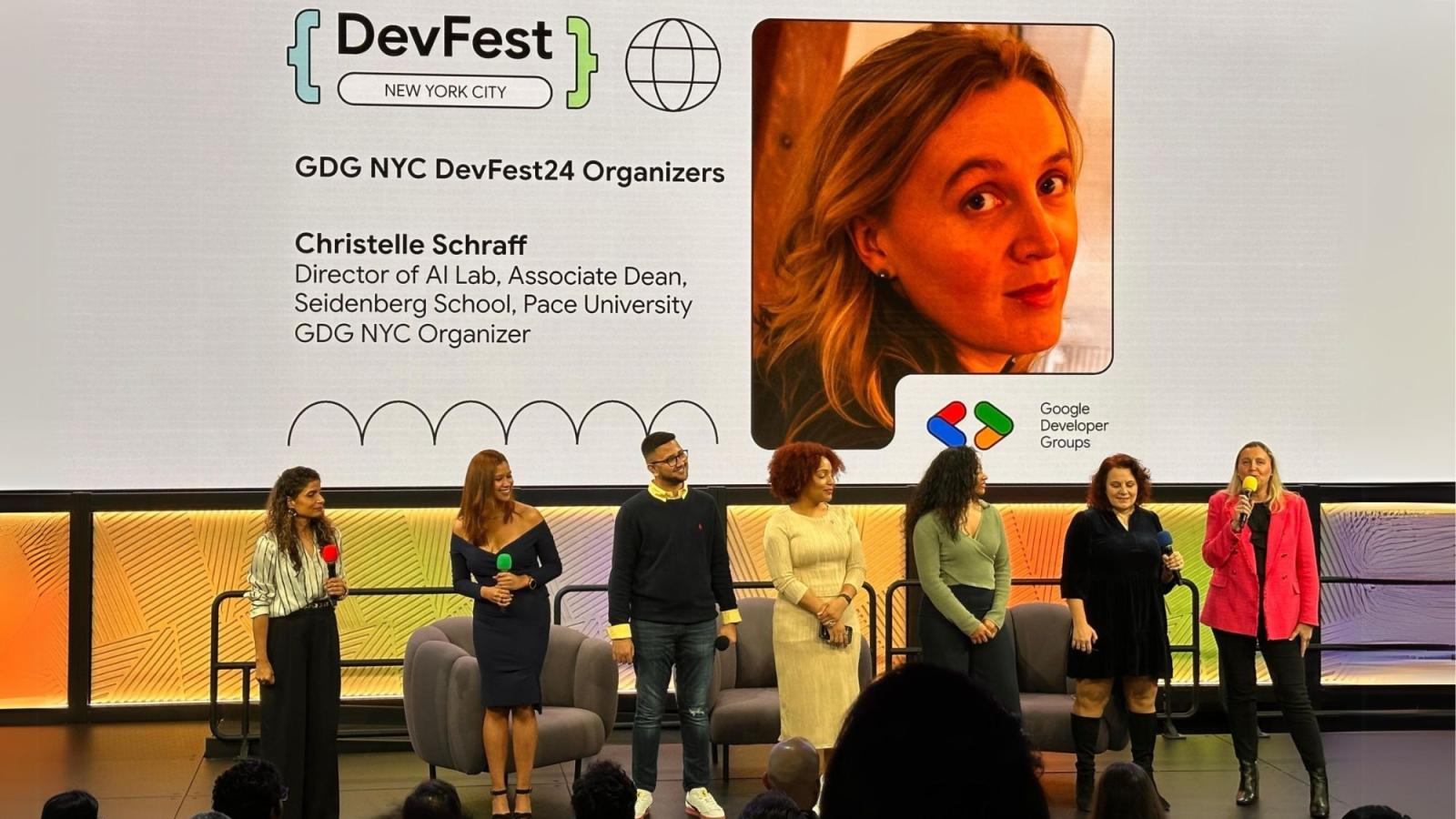

Google Pier 57 was recently full of energy as over 500 tech enthusiasts gathered for GDG DevFest NYC 2024, an event dedicated to exploring “Responsible AI for the Future of Tech.” Among the organizing team was Seidenberg Professor, Associate Dean, and Co-Director of the Pace AI Lab, Dr. Christelle Scharff, who collaborated with Google Developer Groups (GDG) over two months to curate a compelling agenda featuring Googlers and industry professionals.
The festival, organized by Google Developer Group NYC lead Anna Nerozova, highlighted robust ties between Pace University and the tech community. More than 50 Pace students attended, underscoring the university's and Seidenberg’s commitment to experiential learning and industry engagement. Notable moments included a keynote about responsible AI from Seidenberg Advisory Board member and Pace University Board of Trustees member Peta-Gay Clarke, who serves as the Global Community Programs Lead at Google. Dr. Scharff had the honor of introducing Clarke, while she also delivered an insightful lightning talk, “From Pixels to Fashion,” on her own research into AI and fashion, sparking conversations with students from Pace and beyond, including peers from NYU and Stevens Institute.
Seidenberg’s Lauren DeMaio, an MS in Computer Science student and leader of the Google Developer Student Club at Pace, introduced two of the event's speakers, further showing her dedication to bridging academic learning with industry practice. Seidenberg alum Bhavik Chopra, now a Data Analyst at Metropolitan Transportation Authority, was also heavily involved in organizing the event.
Reflecting on the event, Dr. Scharff shared that she was honored to be at the event among so many peers and students, and that “the collaboration and enthusiasm at GDG DevFest NYC reflect the dynamic future of AI and its role in shaping technology responsibly.”
GDG DevFest NYC exemplified the power of partnerships, knowledge-sharing, and hands-on learning. Seidenberg's presence not only highlighted the school’s leadership in tech education but also inspired students to actively engage in shaping the tech of tomorrow.
For more on Seidenberg's involvement in groundbreaking tech events, visit GDG DevFest NYC 2024.
Press Release: Pace University Receives $476K Mellon Foundation Grant to Advance Environmental Justice and Humanities
Pace University was recently awarded $476,000 from the Mellon Foundation to support a three-year interdisciplinary initiative, Islands, Archipelagos, and Cultural Ecologies. The project will advance environmental justice and the environmental humanities at Pace, building on the university’s strengths in experiential learning and place-based education.

Three-year project will explore themes of resilience, decolonization, and cultural ecologies
Pace University was recently awarded $476,000 from the Mellon Foundation to support a three-year interdisciplinary initiative, Islands, Archipelagos, and Cultural Ecologies. The project will advance environmental justice and the environmental humanities at Pace, building on the university’s strengths in experiential learning and place-based education.
The initiative will focus on developing an institutional identity for Pace’s lower Manhattan location as an island campus in New York City while connecting with other archipelagos in relationship with the United States. Through comparative studies of the islands of New York with the US legacy in the Marshall Islands and the territory of the US Virgin Islands the program will explore themes of vulnerability, responsibility, resilience, and decolonization.
“This grant provides an extraordinary opportunity for Pace University to deepen its leadership in environmental justice and interdisciplinary scholarship,” said Pace University President Marvin Krislov. “The Mellon Foundation’s support will enable us to harness the collective expertise of our faculty and students, bridging the humanities and environmental sciences to address urgent local and global issues.”
Led by a team of Pace faculty, the initiative includes Erica Johnson PhD, associate chairperson and professor of English; Emily Welty PhD, department chairperson and associate professor of the Peace and Justice Studies program; Matthew Bolton PhD, Political Science professor; Melanie DuPuis PhD, Environmental Studies and Science emeritus professor; and Katrina Fischer Kuh, Haub Distinguished Professor of Environmental Law.
“The Mellon Foundation grant underscores the humanities’ essential role in addressing critical global challenges,” said Tresmaine R. Grimes, Ph.D., dean of the Dyson College of Arts and Sciences and the School of Education. “This initiative highlights Pace’s leadership in experiential humanities, empowering students to explore resilience, decolonization, and cultural ecologies through innovative, place-based learning.”
The project is motivated by Pace’s recent participation in the Climate Exchange, a multi-institution initiative addressing climate challenges, and faculty research in environmental law, justice, and humanities. It will support activities such as faculty-mentored student research, curriculum development, and public engagement projects to address issues like waterfront planning, cultural production, and nuclear justice.
“The Elisabeth Haub School of Law has long been a leader in environmental law and justice,” said Horace Anderson Jr., J.D., dean of the Elisabeth Haub School of Law. “This initiative builds on our expertise in addressing the complex relationships between law, policy, and the environment, and it offers an unparalleled opportunity for interdisciplinary collaboration.”
“These themes—climate justice, creative interventions, and decolonization—reflect the core strengths of our faculty and the mission of Pace University,” said Johnson. “This initiative will amplify Pace’s role as a leader in environmental humanities and justice.”
The initiative aligns with Pace University’s commitment to experiential learning and interdisciplinary collaboration, creating opportunities for students and faculty to explore pressing global challenges while contributing to local communities.
About The Andrew W. Mellon Foundation
The Andrew W. Mellon Foundation is the nation’s largest supporter of the arts and humanities. Since 1969, the Foundation has been guided by its core belief that the humanities and arts are essential to human understanding. The Foundation believes that the arts and humanities are where we express our complex humanity, and that everyone deserves the beauty, transcendence, and freedom that can be found there. Through our grants, we seek to build just communities enriched by meaning and empowered by critical thinking, where ideas and imagination can thrive.
About Pace University
Since 1906, Pace University has been transforming the lives of its diverse students—academically, professionally, and socioeconomically. With campuses in New York City and Westchester County, Pace offers bachelor, master, and doctoral degree programs to 13,600 students in its College of Health Professions, Dyson College of Arts and Sciences, Elisabeth Haub School of Law, Lubin School of Business, Sands College of Performing Arts, School of Education, and Seidenberg School of Computer Science and Information Systems.
Press Release: Pace University Federal Reserve Challenge Team Triumphs in Regional Competition, Earns Top National Ranking
Pace University’s Federal Reserve Challenge Team continues its legacy of excellence, winning the 2024 New York Regional College Federal Reserve Challenge competition and ranking in the top five nationally out of 119 participating institutions— the largest in the competition’s history. The team also received an honorable mention as national finalists, competing against prestigious schools such as Harvard, Princeton, and the University of Michigan.

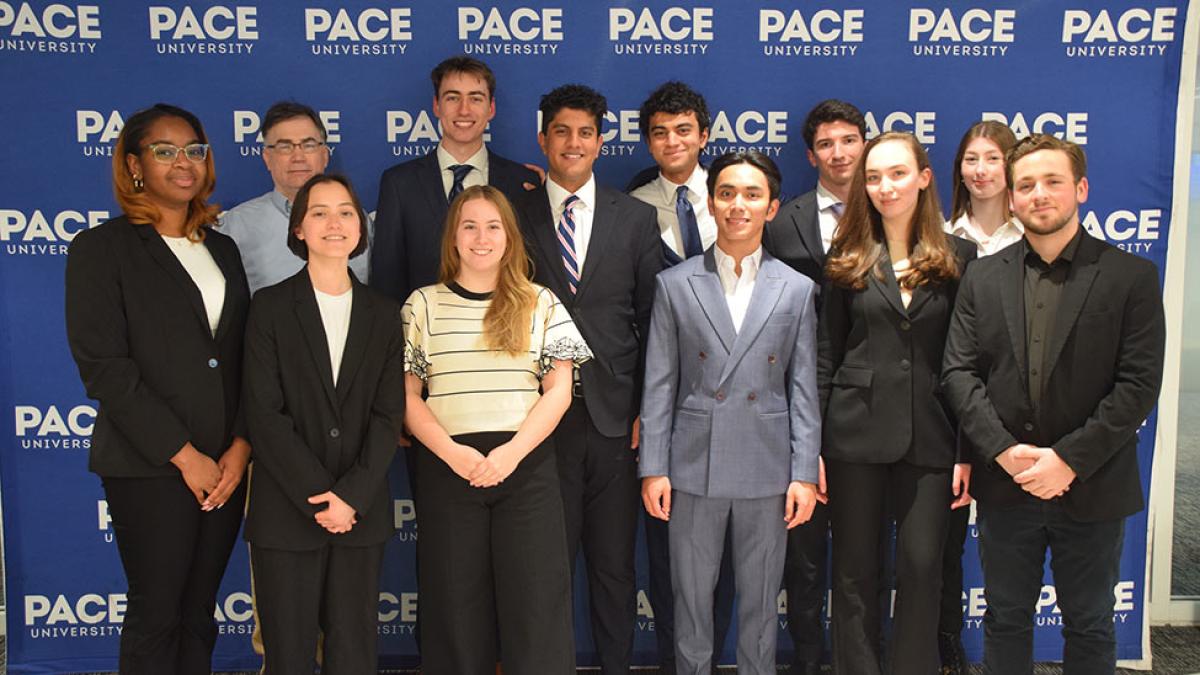
Team secures honorable mention as national finalists, competing among elite institutions.
Pace University’s Federal Reserve Challenge Team continues its legacy of excellence, winning the 2024 New York Regional College Federal Reserve Challenge competition and ranking in the top five nationally out of 119 participating institutions— the largest in the competition’s history. The team also received an honorable mention as national finalists, competing against prestigious schools such as Harvard, Princeton, and the University of Michigan.
The Federal Reserve Challenge is a premier academic competition where college teams analyze current economic conditions and propose monetary policy solutions to Federal Reserve officials. Pace’s team distinguished themselves with their outstanding economic analysis and policy formulation, defeating top regional schools such as New York University, Columbia University, Rutgers University, and Baruch College to claim the regional title. In the semifinals, they surpassed SUNY Oneonta and Manhattan University, advancing to the national stage where they competed against the nation’s top institutions.
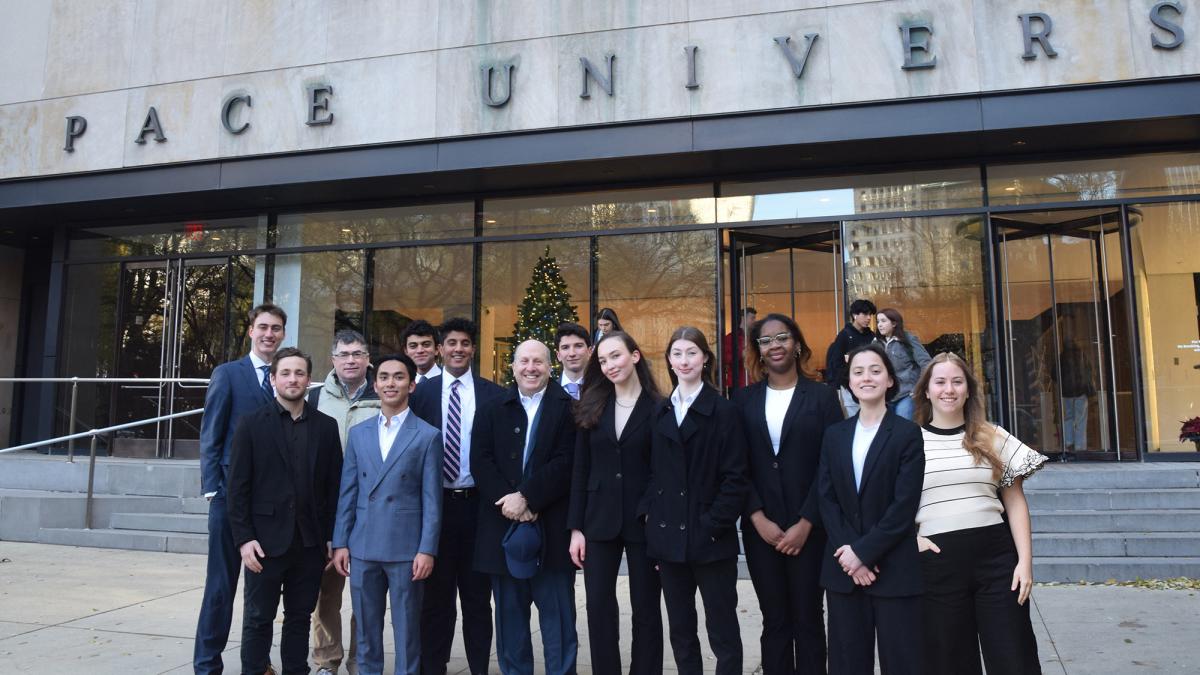
“This team exemplifies the value of experiential learning at Pace,” said Anna Shostya, PhD, chair of the Dyson College of Arts and Sciences’ economics department. “Their success in the regional competition and recognition at the national level highlight their dedication, preparation and the support of our faculty and alumni.”
Led by co-captains economics major Liam Chentoufi ’25, and Suraj Sharma ’25/’26, pursuing a combined Business Economics/MS in Applied Quantitative Economic Analysis and Policy, the team included undergraduate and accelerated degree students:
- Justin Boudreau ’25 (Computer Science, Economics)
- Brooklyn Bynum ’26 (Business Economics/MS Applied Quantitative Economic Analysis and Policy)
- Gunnar Freeman ’26 (Computational Economics)
- Shaniah James ’26 (Economics/MS Applied Quantitative Economic Analysis and Policy)
- Grace McGrath ’26 (Economics/MS Applied Quantitative Economic Analysis and Policy)
- Kristina Nasteva ’26 (Business Economics)
- Harvey Nguyen ’26 (Economics/MS Applied Quantitative Economic Analysis and Policy)
- Giancarlo Raspanti ’26 (Business Economics/MS Applied Quantitative Economic Analysis and Policy)
- Viktoriia Yevtushenko ’25 (Business Economics)
Chentoufi reflected on the transformative impact of the competition. “The Fed Challenge hones students' abilities to parse incoming, and sometimes contradictory, data while teaching them how to communicate economic stories effectively,” he said. “It's hard to imagine how different life would be if I hadn't found the Fed Team. Participating in the Challenge and learning under the economics department has impacted my life in more ways than I can fathom, and I am forever indebted to those who have made this possible.”
Sharma emphasized the program’s career benefits, noting, "The Pace Fed Team is a direct gateway to understanding how central bank policy shapes economies and unlocks prestigious opportunities on Wall Street and beyond. The Team's near-perfect track record is proof of this; every member has either secured an internship or is actively interviewing—a testament to the program's impact. The mentorship from advisors and alumni, and the privilege to lead such a hardworking group, fulfills the promise of opportunity Pace guaranteed us years ago."
The team was coached by professor Gregory Colman, PhD, professor of economics, and Mark Weinstock, CBE, clinical associate professor of economics.
“I am incredibly proud of this team,” said Colman. “Their dedication, resilience and ability to address complex economic challenges are a testament to their hard work and the strength of our program.”
“The students demonstrated an impressive understanding of monetary policy and the U.S. economy,” added Weinstock. “Their commitment and preparation for the competition’s challenging Q&A section were especially remarkable.”
The College Federal Reserve Challenge highlights Pace’s commitment to experiential learning. Many alumni who participated in the competition have gone on to secure prestigious internships and employment opportunities due to their experience at the award-winning competition. In fact, these alumni often return to mentor current teams, fostering a cycle of student success and career readiness.
In recognition of Pace University‘s consistent performance and success in the College Federal Reserve Challenge, John Williams, president of the Federal Reserve Bank of New York, has accepted an invitation from the Fed team captains to speak at the Pace Economics Society and Women in Economics student organizations in February 2025. This follows their October event featuring renowned labor economist Daniel Hamermesh on Pace’s New York City campus.
About Pace University
Since 1906, Pace University has been transforming the lives of its diverse students—academically, professionally, and socioeconomically. With campuses in New York City and Westchester County, Pace offers bachelor, master, and doctoral degree programs to 13,600 students in its College of Health Professions, Dyson College of Arts and Sciences, Elisabeth Haub School of Law, Lubin School of Business, Sands College of Performing Arts, School of Education, and Seidenberg School of Computer Science and Information Systems.
About Dyson College of Arts and Sciences
Pace University’s liberal arts college, Dyson College, offers more than 50 programs, spanning the arts and humanities, natural sciences, social sciences, and pre-professional programs (including pre-medicine, pre-veterinary, and pre-law), as well as many courses that fulfill core curriculum requirements. The College offers access to numerous opportunities for internships, cooperative education and other hands-on learning experiences that complement in-class learning in preparing graduates for career and graduate/professional education choices.
Why Is Trump Threatening A 100% Tariff On The BRICS Nations?
Professor Weinstock speaks to CBS News about Trump’s proposal to impose a 100% tariff on nine nations— known as BRICS — if they try to replace the U.S. dollar with another currency.
The JonBenét Ramsey Netflix Doc And How The Way We Talk About Her Has Changed
Dyson Professor Melvin Williams shares insights with USA Today on the Netflix documentary series Cold Case: Who Killed JonBenét Ramsey? and its exploration of the culture of child beauty pageants and their lasting impact.
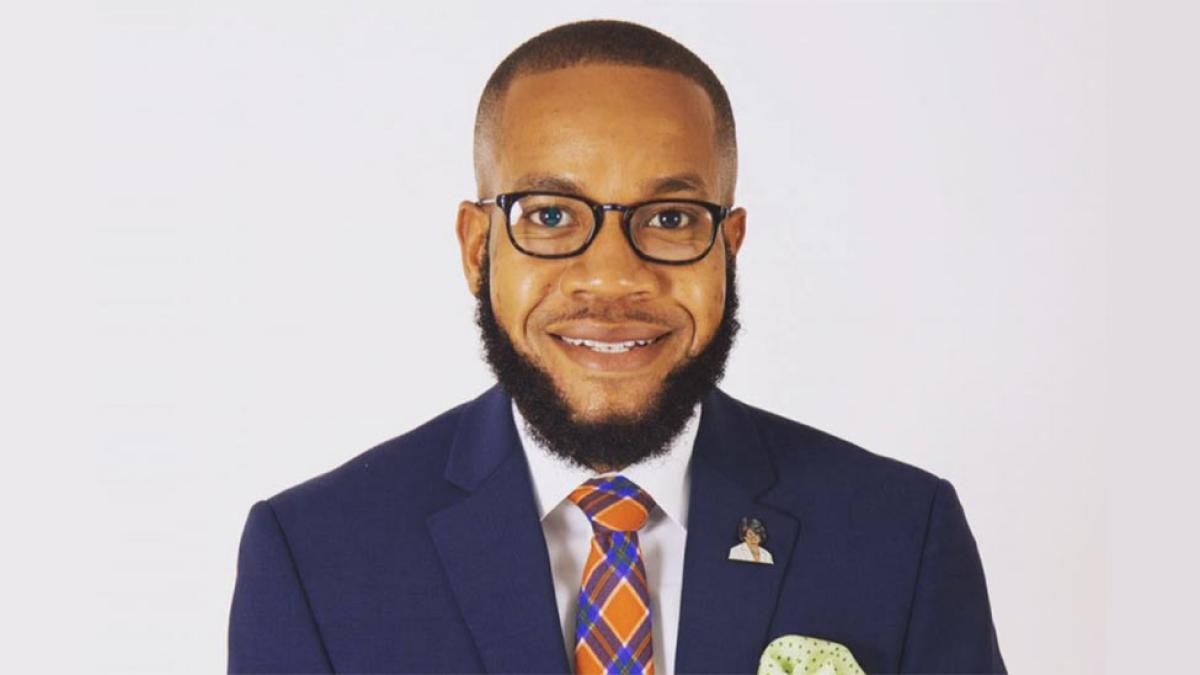
What Trump’s Second Presidency Could Mean for Student Loans
Economic Professor Mark Weinstock discusses the potential impact of Trump’s second presidency on student loans with GOBankingRates.
Despite Dismissal, Legal Scholar Says "Scathing" Trump Evidence Could Still Come Out
- Read more about Despite Dismissal, Legal Scholar Says "Scathing" Trump Evidence Could Still Come Out
Elisabeth Haub School of Law Professor Bennett Gershman provides legal sight to Salon analyzing how, despite the dismissal of certain charges, scathing evidence against Trump could still emerge.
